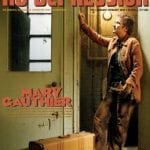Remembering Larry Brown
The soul of the world shrank a bit on November 24, when southern fiction author Larry Brown passed away. He died of a heart attack in his sleep. He was only 53, and left behind his wife, three children, and two grandchildren. He died at home in Mississippi, in his own bed, in the place he had loved all his life.
That place fed his writing, making him one of the most revered and brilliant writers of our time. His books included Facing The Music, Dirty Work, On Fire, Big Bad Love, Joe, Father And Son, Billy Ray’s Farm, Fay, and The Rabbit Factory. His work won the praise of critics across the nation, shelves of awards, and the admiration of thousands.
But Larry Brown was more than a great writer. He was also a great man. And one thing Larry would want you to know is that he was also a man who loved music.
In issue #34 of No Depression, Larry penned a piece about one of his favorite singer-songwriters, Robert Earl Keen, that started like this: “At every show you can see them, pressed in tight with their faces turned up. The music goes out over them and holds them in sway…They know the words to the songs and they sing them out loud…I’ve stood there…I know what they hear. I know what they see. And I know what they feel that makes them look that way. They just love the song, bro.”
Larry understood the power of music. He understood its communal and private impact. One of his favorite things was to fill up a red cooler with cans of Bud and drive around the Mississippi countryside in his beat-up truck with his stereo turned up loud. He especially loved driving to music in the gloaming, that still time between night and day. For the last year or so before his death, Larry was on a personal quest for everyone he knew to love the music of Minnesota singer-songwriter Ben Weaver as much as he did. One summer evening he loaded the cooler, his Weaver discs, and me into his truck and we hit Highway 334 out to Tula, his favorite place in the world, where he was building a writing cabin (which he called “the shack”) on a pond he had fished in as a child and later bought. “Man, this guy has got it,” he said. “He’s the real deal because he makes you feel the music.”
Then he hit his brakes, turned off the truck, and we sat there listening to the song. Larry shook his head in satisfaction at a particularly beautiful line, leaned forward and peered out the windshield. The sky was huge and low, the horizon afire with blazes of red and peach. We sat there a long time. You can do that on the backroads of Tula, sit in the middle of the road without being disturbed. And when the song went off, Larry was still looking out at the sunset. “There really is something about the light in August,” he said. “Music like that and a sky like that. Don’t get no better, bro.” He started up the truck and we drove on.
Larry was a constant disciple for good music. He took Alejandro Escovedo, Blue Mountain and others on book tours with him. The characters he created were like characters in the best songs, and they always loved music — the kind you’ll find in the pages of this magazine but rarely on the radio. The kind that has a sense of dignity and heritage, like Larry did. The kind that can be a soundtrack to an August sunset in Mississippi.
Not long before his death, Larry bought a Gibson Hummingbird that became one of his prized possessions. It was a beauty. He wrote songs and sang them with his eyes closed. He stomped his booted foot in rhythm. He often preceded or ended his songs by saying, “I ain’t much of a singer,” but he was. Because when he sang, he felt it. And he made the listener feel it, too.
At Larry’s funeral, his Hummingbird was perched right beside his casket. And when he was buried on the rise above his pond, across the water from his writing shack, a man stood up and played “Will The Circle Be Unbroken” as a gray sky hovered low and the cedars scratched together in strong gusts of wind and sideways rain. Every single person who was crowded in there sang along. All those voices raised in song. Every person there had to realize what Larry had always known, that music was something that was not only heard, but felt.
I bet he loved that moment.




